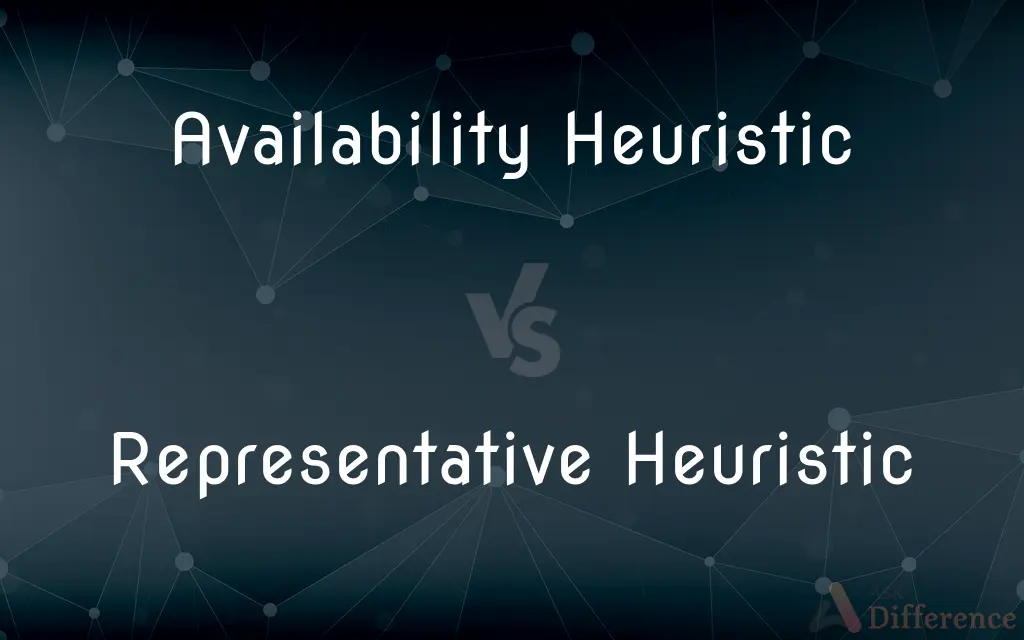Availability Heuristic vs. Representative Heuristic — What's the Difference?
By Fiza Rafique & Maham Liaqat — Published on March 8, 2024
The availability heuristic relies on immediate examples that come to a person's mind, affecting their perception and judgment, while the representative heuristic judges the probability of an event by comparing it to an existing prototype in their mind.

Difference Between Availability Heuristic and Representative Heuristic
Table of Contents
ADVERTISEMENT
Key Differences
The availability heuristic is a mental shortcut that relies on immediate examples that come readily to mind when evaluating a specific topic, concept, event, or decision. This means that if something can be recalled easily, it is often seen as more common or likely. For example, after hearing about airplane accidents, one might overestimate the dangers of flying due to the ease with which these incidents are recalled.
The representative heuristic, on the other hand, involves estimating the likelihood of an event by comparing it to an existing prototype that comes to mind. It is about assessing similarity and often leads to neglect of base rate information. For instance, someone might judge a quiet, bookish individual as more likely to be a librarian than a salesperson, based on stereotypes of how each job's representative behaves.
Availability can lead to biased judgments and decision-making because it is influenced by how recent, emotionally charged, or vivid certain memories are, rather than by all relevant data. This can skew perception and lead to overestimating or underestimating the prevalence of events. Representative heuristic, however, might cause one to overlook relevant statistical information in favor of anecdotal evidence or stereotypes, leading to a misjudgment of probability based on how much an individual resembles a certain group or category.
Both heuristics are used because they offer quick, effortless ways to make complex decisions and judgments without the need for thorough analysis. While they can be helpful in navigating daily life efficiently, they can also lead to systematic errors or biases in judgment. Recognizing when these heuristics are at work is crucial for critical thinking and making more informed decisions.
In distinguishing between these two, it's essential to note that while availability is about the ease of recall, representative focuses on similarity to prototypes. Both play significant roles in how people make judgments about probability and risk, but they operate on different aspects of cognition. Understanding the nuances between them can aid in identifying and mitigating biases in one's thought process.
ADVERTISEMENT
Comparison Chart
Basis
Ease of recall
Similarity to a prototype
Influence
Recent, vivid, or emotional memories
Stereotypes or perceived typical features
Common Bias
Overestimation or underestimation of event likelihood
Misjudgment of probability due to resemblance
Decision Making
Influenced by memory's accessibility
Influenced by perceived representativeness
Error Type
Biased by recency or media coverage
Ignoring base rates and statistical reality
Compare with Definitions
Availability Heuristic
Can lead to overestimating the frequency or likelihood of events.
They assumed burglaries were rampant in their neighborhood after a recent incident, highlighting the availability heuristic.
Representative Heuristic
A mental shortcut where the probability of an event is assessed by comparing it to a similar prototype.
Believing someone is a librarian based on their quiet demeanor and love for books showcases the representative heuristic.
Availability Heuristic
A cognitive shortcut that relies on immediate examples that come to mind.
After watching news reports on shark attacks, she overestimated the risk of swimming in the ocean.
Representative Heuristic
Can lead to stereotyping or overlooking actual probabilities.
Assuming the coin toss would result in heads after five tails in a row is a misuse of the representative heuristic.
Availability Heuristic
Influenced by how easily something can be remembered.
His fear of flying increased after his friend's recent flight mishap, a classic case of the availability heuristic.
Representative Heuristic
Involves judging by how representative a detail is, often neglecting statistical information.
He guessed she was a nurse because she was compassionate, a decision influenced by the representative heuristic.
Availability Heuristic
Can bias decision-making and judgment.
Deciding not to invest in stocks because of one market crash she recalls vividly is an example of the availability heuristic at work.
Representative Heuristic
Relies on perceived similarities rather than actual likelihood.
Thinking the quiet student must be good at chess uses the representative heuristic.
Availability Heuristic
Affected by recent, vivid, or emotional content.
The dramatic car chase reported yesterday made him overestimate crime rates due to the availability heuristic.
Representative Heuristic
May cause neglect of base rate information.
Choosing a card from a deck with more spades as likely being a spade is a fallacy of the representative heuristic.
Common Curiosities
Can awareness of these heuristics improve decision-making?
Yes, being aware of these heuristics can help individuals recognize potential biases in their thinking and make more informed decisions.
Are these heuristics considered a form of cognitive bias?
Yes, they are types of cognitive biases that affect the accuracy of our judgments and decisions.
How do these heuristics affect our daily life?
They simplify decision-making processes but can lead to systematic biases in how we perceive risk, make judgments, and evaluate probabilities.
What is the main difference between availability and representative heuristics?
The main difference lies in their basis: availability heuristic is influenced by ease of recall, while representative heuristic is based on similarity to a prototype.
Do experts in a field rely less on these heuristics?
Experts may rely on them less in their area of expertise due to their knowledge and experience but can still be susceptible to them in other areas.
Do these heuristics play a role in social judgments?
Yes, they significantly influence social judgments, affecting how we perceive and interact with others.
Can these heuristics lead to incorrect decisions?
Yes, both can lead to biases and errors in judgment by oversimplifying complex decisions.
How can one reduce the impact of these heuristics on decision-making?
Critical thinking, seeking out additional information, and being aware of these biases can help mitigate their impact.
Is the representative heuristic related to stereotyping?
Yes, it can lead to stereotyping because it involves making judgments based on how well someone or something matches a preconceived prototype.
Are these heuristics universally experienced?
Yes, they are common cognitive shortcuts used by people across different cultures and backgrounds.
How does media coverage affect the availability heuristic?
Media can significantly influence the availability heuristic by frequently reporting on certain types of events, making them seem more common than they are.
Can these heuristics be beneficial?
While they can lead to errors, they also serve a useful function by allowing for quick, efficient decision-making in complex environments.
How does the representative heuristic affect gambling behavior?
It can lead to the gambler's fallacy, where people expect outcomes in random processes to balance out.
How does emotion influence the availability heuristic?
Emotionally charged events are more easily recalled, thus having a greater impact on judgments and decisions through the availability heuristic.
Can these heuristics be overridden by logical reasoning?
With effort and awareness, logical reasoning can override these heuristics, though it requires conscious effort.
Share Your Discovery

Previous Comparison
Orthodox Christians vs. Protestant Christians
Next Comparison
Also vs. As WellAuthor Spotlight
Written by
Fiza RafiqueFiza Rafique is a skilled content writer at AskDifference.com, where she meticulously refines and enhances written pieces. Drawing from her vast editorial expertise, Fiza ensures clarity, accuracy, and precision in every article. Passionate about language, she continually seeks to elevate the quality of content for readers worldwide.
Co-written by
Maham Liaqat















































